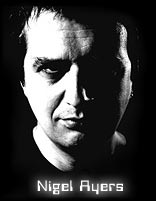 |
following
you'll find an exerpt of an interview w. Nigel Ayers from Sound
Projector #7; April 2000
"If
you look at the whole of that so-called 'Industrial' scene from
Cabaret
Voltaire to Marilyn Manson, the band
with the most far-reaching influence wouldn't be Throbbing
Gristle, but...Hawkwind!
This is something
that they rarely mention in the press, as Hawkwind have this reputation
as a British 'hippie band' who do 'science fiction' and theatrics,
and therefore must be naff. Whereas if they were a German hippie
band... Zoviet France have told me they were very keen on Hawkwind.
SPK were well into
Hawkwind back in Australia. And what are Graeme
Revell (SPK) and Brian
Williams (Lustmord) doing
nowadays? Making soundtracks for science fiction films - I rest
my case!
I think it's about time Hawkwind were reassessed.
I have long been tired of those outfits who cite influences no-one
has heard of, or can stand listening to.
Back in the early 70s, Hawkwind
were the first band I was aware of to popularise the idea of sonic
attack: infra- and ultra- sound as a weapon.
Listen to 'Sonic
Attack' on Space
Ritual. That of course has long since been taken up
by that whole noise scene, but Hawkwind
were rarely acknowledged.
If you look at the 'information war' thing, you'll notice that Hawkwind
had the post-modern writers, Michael
Moorcock and Bob
Calvert working with them. Though Moorcock is best
known for his very popular science fiction and fantasy genre work,
it's more accurate to call him a postmodernist, or at least a modernist.
Moorcock pointed many in the direction of William
Burroughs and J.G.
Ballard - and stone me, he even wrote for Re/Search.
When Hawkwind's In
Search of Space came out in the early 70s, it came
with a booklet of very similar material to what the London Psychogeographical
Society, The Association of Autonomous Astronauts, Ian Sinclair,
and Tom Vague have been doing more recently. Whenever I used to
see Psychic
TV, I thought 'Hawkwind'. Whenever I saw Throbbing
Gristle I thought 'Hawkwind without the lights...and
without the tunes'. That combat
clothing thing - Hawkwind!
Which brings me to the point that I would definitely question: the
history of punk rock and weird music that overlaps it, that media
hacks have tended to spout. I remember that, apart from media darlings
the Sex
Pistols, the DIY punk scene in early 70s Britain seemed
to be much inspired by the efforts of Hawkwind,
the Edgar Broughton Band, the
Pink Fairies and even Gong
- and the context of the free festivals - a self-organising proletarian
cultural gathering often involving a bit of a knees up and maybe
a punch up with the coppers. See also 'rave'. Brian
Eno, for example used to hang out with the Pink
Fairies. The whole set-up and costuming of Roxy
Music was a direct crib off Hawkwind.
AMM - my arse! Eno's a populist, otherwise why's he working with
U2? In 1972 Hawkwind followed up 'Silver
Machine' - a million selling hit about a time travel
machine built by the pataphysicist Alfred Jarry - with the single
'Urban
Guerrilla'. It was pulled by the record company because
of fears about an IRA bombing campaign in London at the time. They
later re-recorded it with Johnny Rotten. Joe
Strummer's 101'ers and The
Stranglers used to play on the same bill as Hawkwind
in the free festival days, pre 1976.
In interviews at the time, Strummer
cited Hawkwind as an influence on The Clash's first album. Pete
Shelley of The
Buzzcocks admitted he spent a lot of his youth listening
to Space Ritual
and derived a lot of his musical direction from it.
And of course Lemmy
of Motörhead used to play bass in Hawkwind. I
went to see Sun Ra and his Arkestra once, and I got bored after
20 minutes of that jazz shite and went home. I've seen Hawkwind
loads of times and they rock!"
[photos of N.A.
by Charlotte Richardson -
interview excerpt re-published with kind permission
of Nigel Ayers -
the complete interview can be found HERE]
|
 >
Nigel Ayers
>
Nigel Ayers ![]() on
on
![]() Robert
Calvert
Robert
Calvert 